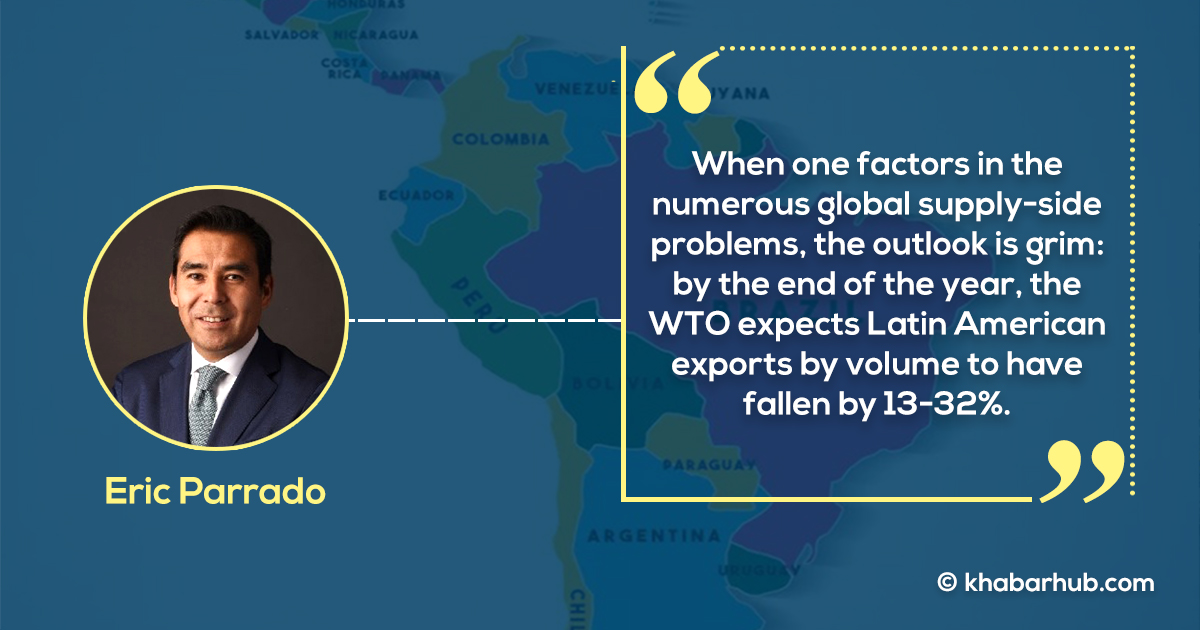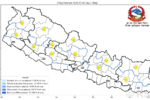Few things are as terrifying for emerging economies as the sudden stop that occurs when foreign investors lose confidence, take their capital, and flee – usually triggering currency devaluations and recessions.
Latin America and the Caribbean is now facing an unprecedented triple sudden stop involving major disruptions to human mobility, trade, and capital flows. Meeting this challenge will require astute policymaking, discipline, and creativity.
The first sudden stop involves the economic paralysis stemming from the lockdowns imposed to protect public health.
A mobility tracker developed by the Inter-American Development Bank for 20 Latin American and Caribbean (LAC) countries shows that between the second week of March and the third week of June, the number of people traveling more than one kilometer daily fell by levels ranging from 22% in Brazil to 48% in Chile. Many people have been unable to earn money or spend it.
Classic sudden-stop crises are characterized by a self-correcting mechanism: A reduction in capital inflows causes the real exchange rate to depreciate, resulting in an adjustment in current-account deficits, a drop in imports, more competitive exports, and an inflow of money.
Travel restrictions have also affected international businesses and tourism. According to the Latin American and Caribbean Air Transport Association, airlines operating in the region carried just 1.08 million passengers in April, down from 35.3 million the previous year.
Tourism, which accounts for one in ten jobs and an average of 18% of GDP in the smaller LAC countries, is also in a slump. It is still unclear when the sector will be able to reclaim its vital role in the region.
Trade is the second sudden stop. The region’s exports have taken a tremendous hit, and the prices for key Latin American commodities have continued to drop substantially.
From the fourth quarter of 2019 to late May, oil prices have collapsed by 50%, and copper and soybeans are down 11%. The overall decline in global demand, owing to lower consumption and deferred investment, has spread from China to the United States and Western Europe, affecting their LAC trading partners.
When one factors in the numerous global supply-side problems, the outlook is grim: by the end of the year, the World Trade Organization expects Latin American exports by volume to have fallen by 13-32%.
Finally, there is the sudden stop in capital flows. By late January, four of the seven largest Latin American countries – Brazil, Chile, Colombia, and Mexico – recorded net capital inflows of $18.6 billion.
By the end of March, that had reversed to $15.6 billion in net outflows, according to data from EPFR Fund Flows and Haver Analytics. Moreover, the United Nations Conference on Trade and Development estimates that inward foreign direct investment fell by 40-55%.
Meanwhile, the average country risk, as reflected in the Emerging Market Bond Index spreads, rose from 420 in early January to a peak of 1126 basis points in late April, according to data from Refinitiv, although it has since subsided to 728 basis points in August.
In short, many countries in the region are seen as too risky; borrowing costs have soared, and in some cases become prohibitive.
Remittances, a key source of income for millions of Latin American households, plummeted at the beginning of the pandemic, as expatriates lost their jobs and could no longer send money home.
According to data from their respective central banks, remittances in April fell by 27.9% in Honduras, 40% in El Salvador, and 20.2% in Guatemala, compared to April 2019.
Nonetheless, remittances have recovered in recent months, largely owing to unprecedented social-assistance programs, which have underpinned a historic divergence between GDP and disposable income in the United States, a host country for many LAC migrants.
But fiscal balances and public-debt ratios have deteriorated considerably since the global financial crisis of 2008-09, making public outlays and stimulus extremely difficult.
Nonetheless, given great uncertainty about the continued increase in disposable income, remittance inflows to the region as a whole could fall 20-30% year on year in 2020, according to IDB calculations.
Classic sudden-stop crises are characterized by a self-correcting mechanism: A reduction in capital inflows causes the real exchange rate to depreciate, resulting in an adjustment in current-account deficits, a drop in imports, more competitive exports, and an inflow of money.
Such deficits are widespread throughout the LAC region today. But with a synchronized global crisis in full swing, it is hard to see how the region can export its way out of this crisis.
Indeed, with financial markets and global value chains more integrated than at any time in human history, the effects of the COVID-19 pandemic are already similar to those of the 1980s debt crisis or the Great Depression in the 1930s.
The good news is the region could get a big infrastructure dividend, and even small improvements in service efficiency can boost growth by 3.5 percentage points over a ten-year period.
It is highly likely that Latin America and the Caribbean will suffer a large recession this year, losing 8-10% of GDP, implying that the region will take more than three years to recover to pre-pandemic GDP trend levels.
The situation is further complicated by dire pre-existing conditions, including low levels of productivity and social crises.
Addressing these problems will require higher health-care spending, government transfers to the poor, and loans to struggling firms.
But fiscal balances and public-debt ratios have deteriorated considerably since the global financial crisis of 2008-09, making public outlays and stimulus extremely difficult.
One lesson from previous crises is that a sudden stop is not the time to turn inward. On the contrary, the region should seek greater integration through trade agreements and the removal of tariff and nontariff barriers, such as excessive customs controls.
LAC countries will also have to make cuts in public expenditure and eliminate inefficiencies that, according to a recent study by the Inter-American Development Bank, average more than 4% of GDP.
The faster countries contain the pandemic, the sooner they can restart their economies without multiple sudden stops and their crippling consequences.
Eventually, they will have to decide how to increase resiliency through capital spending that boosts productivity and spurs growth.
Governments will also have to increase taxes to improve income distribution through social safety nets and provide better public services.
The good news is the region could get a big infrastructure dividend, and even small improvements in service efficiency can boost growth by 3.5 percentage points over a ten-year period.
The triple-stop danger means action must be taken on multiple fronts, even as societies learn to live with the pandemic and possible future waves.
The region will emerge from this crisis poorer, more indebted, and with a greater income-distribution problem.
The faster countries contain the pandemic, the sooner they can restart their economies without multiple sudden stops and their crippling consequences.
(Eric Parrado is Chief Economist and General Manager of the Research Department at the Inter-American Development Bank (IDB)
Copyright: Project Syndicate, 2020









Comment